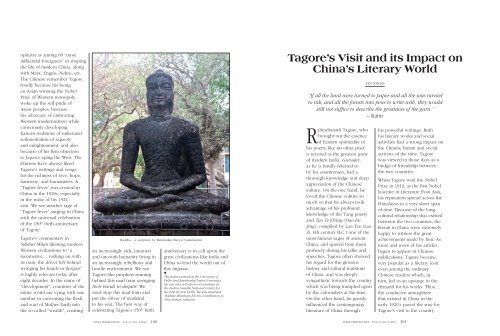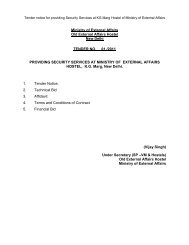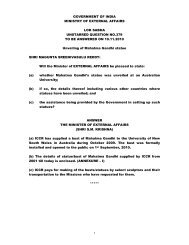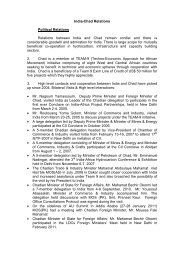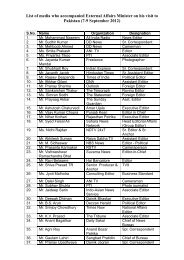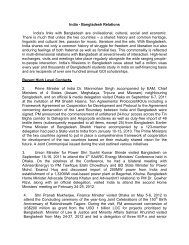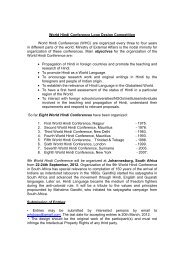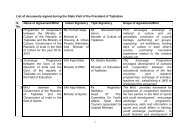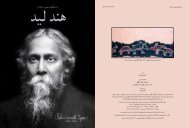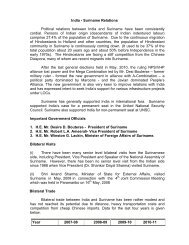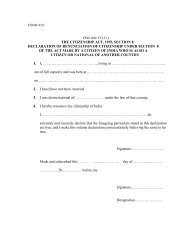IP_ Tagore Issue - Final.indd - high commission of india mauritius
IP_ Tagore Issue - Final.indd - high commission of india mauritius
IP_ Tagore Issue - Final.indd - high commission of india mauritius
You also want an ePaper? Increase the reach of your titles
YUMPU automatically turns print PDFs into web optimized ePapers that Google loves.
opinion as among 60 “mostinfluential foreigners” in shapingthe life <strong>of</strong> modern China, alongwith Marx, Engels, Nehru, etc.The Chinese remember <strong>Tagore</strong>fondly because his beingan Asian winning the NobelPrize <strong>of</strong> Western monopolywoke up the self-pride <strong>of</strong>Asian peoples, becausehis advocacy <strong>of</strong> embracingWestern modernization whileconsciously developingEastern traditions <strong>of</strong> millennialsedimentation <strong>of</strong> sagacityand enlightenment, and alsobecause <strong>of</strong> his firm objectionto Japan’s aping the West. TheChinese have always liked<strong>Tagore</strong>’s writings and songsfor the richness <strong>of</strong> love, hope,harmony, and humanness. A“<strong>Tagore</strong> fever” was created inChina in the 1920s, especiallyin the wake <strong>of</strong> his 1924visit. We see another rage <strong>of</strong>“<strong>Tagore</strong> fever” surging in Chinawith the universal celebration<strong>of</strong> the 150 th birth anniversary<strong>of</strong> <strong>Tagore</strong>.<strong>Tagore</strong>’s commentary inSikshar Milan likening modernWestern civilizations to “alocomotive… rushing on withits train, the driver left behindwringing his hands in despair”is <strong>high</strong>ly relevant today aftereight decades. In the name <strong>of</strong>“development”, countries <strong>of</strong> theentire world are vying with oneanother in converting the fleshand soul <strong>of</strong> Mother Earth intothe so-called “wealth”, creatingBuddha – a sculpture by Ramkinkar Baej at Santiniketanan increasingly sick, immoraland uncouth humanity living inan increasingly rebellious andhostile environment. We see<strong>Tagore</strong>-like prophets runningbehind this mad train wringingtheir hands in despair. Wemust stop this mad train andput the driver <strong>of</strong> mankindto his seat. The best way <strong>of</strong>celebrating <strong>Tagore</strong>’s 150 th birthanniversary is to call upon thegreat civilizations like India andChina to lead the world out <strong>of</strong>this impasse.◆The author served at the University <strong>of</strong>Delhi and Jawaharlal Nehru University.He was also a Pr<strong>of</strong>essor-Consultant atthe Indira Gandhi National Centre forthe Arts in New Delhi. He was awarded‘Padma-Bhushan’ for his contribution toSino-Indian relations.<strong>Tagore</strong>’s Visit and its Impact onChina’s Literary WorldYIN XINAN“If all the land were turned to paper and all the seas turnedto ink, and all the forests into pens to write with, they wouldstill not suffice to describe the greatness <strong>of</strong> the guru.”– KabirRabindranath <strong>Tagore</strong>, who‘brought out the essence<strong>of</strong> Eastern spirituality inhis poetry like no other poet’is revered as the greatest guru<strong>of</strong> modern India. Gurudev,as he is fondly referred toby his countrymen, had athorough knowledge and deepappreciation <strong>of</strong> the Chineseculture. On the one hand, heloved the Chinese culture somuch so that he always tookadvantage <strong>of</strong> his pr<strong>of</strong>oundknowledge <strong>of</strong> the Tang poetryand Tao Te Ching (Dao DeJing), compiled by Lao Tze (LaoZi, 6th century B.C.) one <strong>of</strong> themost famous sages <strong>of</strong> ancientChina, and quoted from thempr<strong>of</strong>usely during his talks andspeeches. <strong>Tagore</strong> <strong>of</strong>ten showedhis regard for the glorioushistory and cultural traditions<strong>of</strong> China, and was deeplysympathetic towards the countrywhich was being trampled uponby the colonialists at the time.On the other hand, he greatlyinfluenced the contemporaryliterature <strong>of</strong> China throughhis powerful writings. Bothhis literary works and socialactivities had a strong impact onthe Chinese literati and socialactivists <strong>of</strong> the time. <strong>Tagore</strong>was viewed in those days as abridge <strong>of</strong> friendship betweenthe two countries.When <strong>Tagore</strong> won the NobelPrize in 1913, as the first Nobellaureate in Literature from Asia,his reputation spread across theHimalayas in a very short span<strong>of</strong> time. Because <strong>of</strong> the longcultural relationship that existedbetween the two countries, theliterati in China were extremelyhappy to witness the greatachievements made by him. Asmore and more <strong>of</strong> his articlesbegan to appear in Chinesepublications, <strong>Tagore</strong> becamevery popular as a literary iconeven among the ordinaryChinese readers which, inturn, led to an upsurge in thedemand for his works. Thus,the conducive atmospherethat existed in China in theearly 1920’s paved the way for<strong>Tagore</strong>’s visit to the country.INDIA PERSPECTIVES VOL 24 NO. 2/2010 100 INDIA PERSPECTIVES VOL 24 NO. 2/2010 101


